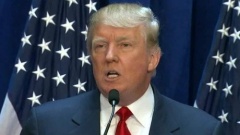Difference between revisions of "Donald Trump"
(Inaugurating) |
m |
||
| Line 24: | Line 24: | ||
Trump’s [[AIPAC]] speech, which unusually for him he read from a prepared text, was a mixture of pandering, implausible bluster and contradictory promises. The billionaire denounced the [[United Nations]] as an anti-Israeli opponent of democracy. “We will totally dismantle Iran’s global terrorist network, which is big and powerful—but not powerful like us,” he promised, without further explanation. He said he would “dismantle the disastrous deal” struck by President [[Barack Obama]] to curb Iran’s nuclear ambitions, then seemed to say that he would enforce it, or perhaps the sanctions regime that preceded it, “like you haven’t seen the terms of a contract enforced.” | Trump’s [[AIPAC]] speech, which unusually for him he read from a prepared text, was a mixture of pandering, implausible bluster and contradictory promises. The billionaire denounced the [[United Nations]] as an anti-Israeli opponent of democracy. “We will totally dismantle Iran’s global terrorist network, which is big and powerful—but not powerful like us,” he promised, without further explanation. He said he would “dismantle the disastrous deal” struck by President [[Barack Obama]] to curb Iran’s nuclear ambitions, then seemed to say that he would enforce it, or perhaps the sanctions regime that preceded it, “like you haven’t seen the terms of a contract enforced.” | ||
| − | In his speech to AIPAC, Trump worked hard to cast himself as sternly pro-Israeli. He variously cited his role as Grand Marshal of the 2004 “Salute to Israel” Parade in New York City and his | + | In his speech to AIPAC, Trump worked hard to cast himself as sternly pro-Israeli. He variously cited his role as Grand Marshal of the 2004 “Salute to Israel” Parade in New York City and his daughter Ivanka’s conversion to Judaism after marriage. Months after angering a gathering of Jewish Republicans by fudging his views on the status of [[Jerusalem]], Trump bowed to conservative pressure and pledged to AIPAC that he would move the American embassy to that divided city, calling it “the eternal capital of the Jewish people”. |
Most straightforwardly, Trump brought his constant campaign-trail refrain about being a savvy businessman and deal-maker to AIPAC, offering America as a broker between Israel and the [[Palestine|Palestinians]]. “Deals are made when parties come to the table and negotiate. Each side must give up something it values in exchange for something it requires,” he told delegates. | Most straightforwardly, Trump brought his constant campaign-trail refrain about being a savvy businessman and deal-maker to AIPAC, offering America as a broker between Israel and the [[Palestine|Palestinians]]. “Deals are made when parties come to the table and negotiate. Each side must give up something it values in exchange for something it requires,” he told delegates. | ||
Revision as of 15:16, 22 March 2016
(billionaire businessman, politician) | |
|---|---|
 | |
| Born | Donald John Trump 14 June 1946 Queen's, New York City |
| Alma mater | Fordham University, University of Pennsylvania |
| Religion | Presbyterian |
| Spouse | • Ivana Zelníčková (1977–91) • Marla Maples (1993–99) • Melania Knauss (2005) |
| Member of | Jeffrey Epstein/Black book, Lolita Express/Passengers, Trump family |
| Supposed perpetrator of | 2021 Washington D.C. Riots |
| Interest of | 7th floor group, Sheldon Adelson, Liz Cheney, Maria Farmer, Noor Bin Laden |
| Subpage | •Donald Trump/2024 presidential campaign •Donald Trump/Assassination attempt in Pennsylvania •Donald Trump/Conspiracy theories •Donald Trump/First Presidency |
Donald Trump is a leading Republican Party contender in the United States presidential election, 2016.[1]
On 21 March 2016, Donald Trump addressed some 18,000 supporters of the American Israel Public Affairs Committee (AIPAC), an influential pro-Israel lobby group, and outlined his most detailed thoughts yet on the prospects for Middle East peace, on curbing Iran’s nuclear ambitions and on defeating the violent extremists of the Islamic State.
Trump’s AIPAC speech, which unusually for him he read from a prepared text, was a mixture of pandering, implausible bluster and contradictory promises. The billionaire denounced the United Nations as an anti-Israeli opponent of democracy. “We will totally dismantle Iran’s global terrorist network, which is big and powerful—but not powerful like us,” he promised, without further explanation. He said he would “dismantle the disastrous deal” struck by President Barack Obama to curb Iran’s nuclear ambitions, then seemed to say that he would enforce it, or perhaps the sanctions regime that preceded it, “like you haven’t seen the terms of a contract enforced.”
In his speech to AIPAC, Trump worked hard to cast himself as sternly pro-Israeli. He variously cited his role as Grand Marshal of the 2004 “Salute to Israel” Parade in New York City and his daughter Ivanka’s conversion to Judaism after marriage. Months after angering a gathering of Jewish Republicans by fudging his views on the status of Jerusalem, Trump bowed to conservative pressure and pledged to AIPAC that he would move the American embassy to that divided city, calling it “the eternal capital of the Jewish people”.
Most straightforwardly, Trump brought his constant campaign-trail refrain about being a savvy businessman and deal-maker to AIPAC, offering America as a broker between Israel and the Palestinians. “Deals are made when parties come to the table and negotiate. Each side must give up something it values in exchange for something it requires,” he told delegates.
In the poisonously divided politics of 2016 Washington, even suggesting that Israel might have to give anything up in the name of peace involves challenging conservative shibboleths. In recent years, Republicans have aligned themselves with the views of Binyamin Netanyahu, the Israeli prime minister, in suggesting that Israel should not be prodded to engage in talks, because the Palestinian side has shown no sincerity or seriousness as a potential partner for peace.[2]